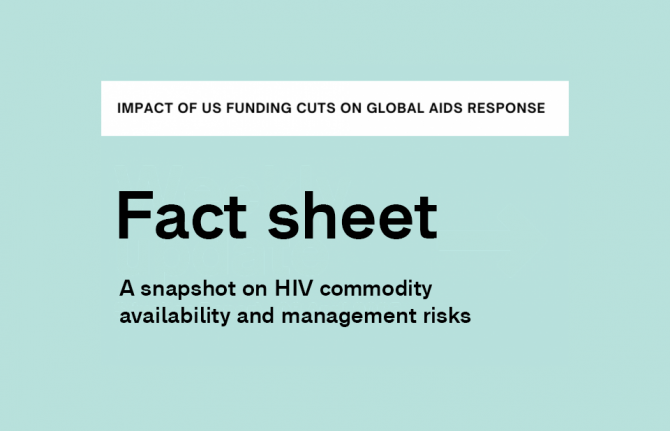

Feature Story
The impact of US funding cuts on HIV programmes in Democratic Republic of Congo
02 Mayo 2025
02 Mayo 2025 02 Mayo 2025Documented impact on services
Stockouts of HIV medication and condoms are expected in the next 3-6 months.
The antenatal testing of pregnant women, delivery care for women living with HIV, early infant diagnosis and paediatric treatment services are all affected.
Data collection at some facilities/service points continues, but data quality control and data collation are affected
Human rights, key and vulnerable populations
There is disruption to PrEP services for adolescent girls and young women (AGYW), a reduced capacity of service delivery points for HIV prevention and a discontinuation of AGYW-specific outreach programs.
There is a limited availability of HIV testing services for AGYW, reduced availability of HIV prevention education and awareness campaigns, and reduction in the availability of counseling and social support services for AGYW.
All programmes on stigma and discrimination have stopped with key populations, AGYW, young people, people living with HIV and other populations affected.
Government convening, mitigation measures
The Ministry of Health has been convening impact assessment meetings, with a special commission set up for this purpose.
The ministry of justice has been leading an impact assessment on human rights violations and the protection of key populations. There have been consultations between the Ministry and organizations representing key populations.
The Ministry of Family and Child’s gender working group has conducted an assessment and a gender-based contingency plan is available.
Civil society impact, resilience and response
Civil society organizations in Haut-Katanga have conducted a risk assessment. Steps are also being taken to set up a public-private partnership with civil society organizations. Advocacy for the mobilization of local resources is underway.
Community-led organizations are at risk of closure or severe reduction in services.
There is an increased difficulty in accessing government or donor support, loss of funding for monitoring activities and a reduced ability to collect and report data.
The involvement of community-led organizations in policy design, advocacy, and work on societal enablers has been affected, resulting in a limited ability to advocate for key issues, a shift in focus due to funding constraints, and a reduced participation in policy discussions.
Service delivery by community-led organizations has been affected by the reduction or suspension of services, with an increased demand with fewer resources, loss of staff or funding cuts.
UNAIDS response
The MPox/HIV project for key populations is underway with partners in Kinshasa.
There is support for resource mobilization with a 2-year Department of Health project.
Support is being provided to the Ministry in charge of Gender and the Ministry of Human Development for the organization of a national HIV forum and mobilization of resources.
Advocacy with German and Canadian embassies, African Development Bank, World Bank and the EU to position the HIV response.
Data support is also being provided to assess the impact of the funding cuts on new HIV infections and AIDS-related deaths.
Related resources
Region/country
Related
 Impact of the US funding cuts: A snapshot on HIV commodity availability and management risks
Impact of the US funding cuts: A snapshot on HIV commodity availability and management risks

01 de mayo de 2025
 Impact of US funding cuts on HIV programmes in Ukraine
Impact of US funding cuts on HIV programmes in Ukraine

22 de abril de 2025
 Impact of US funding cuts on HIV programmes in South Africa
Impact of US funding cuts on HIV programmes in South Africa

22 de abril de 2025
